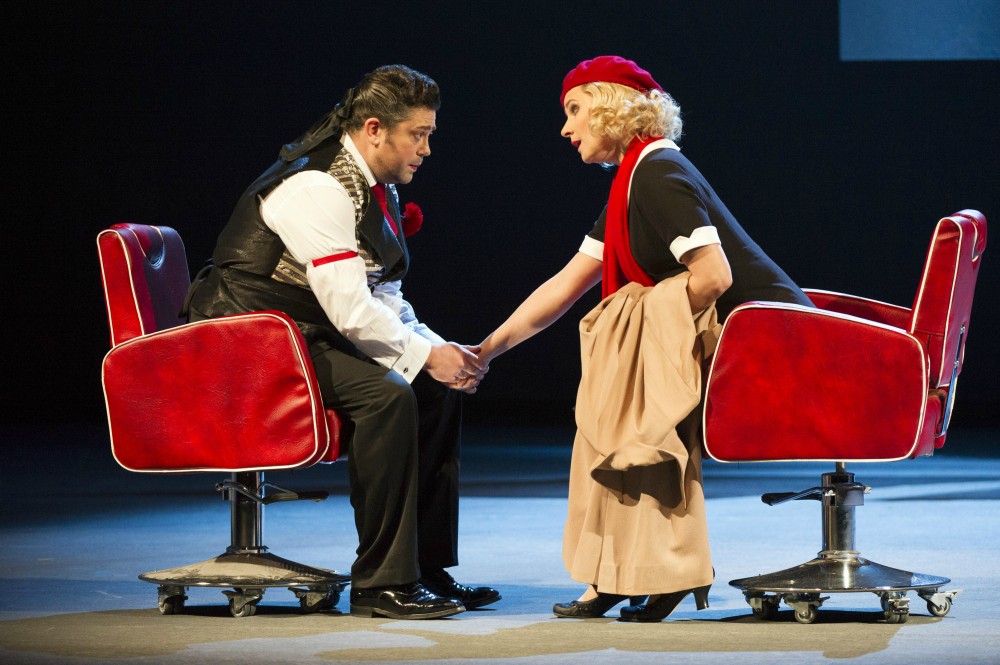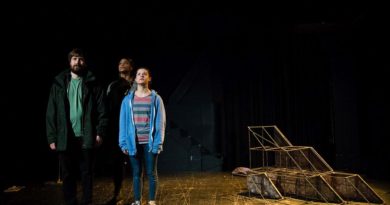Bristol Hippodrome theatre review: Figaro Gets a Divorce
Vivienne Kennedy reviews Figaro Gets a Divorce, the final opera of three making up Welsh National Opera’s Forever Figaro season, playing at Bristol Hippodrome until Saturday 19th March
I experienced a slight feeling of déjà vu as I settled into my seat in the stalls at Bristol Hippodrome last night…the same seat I’d left less than 24 hours earlier…just one row forward from where I sat on Tuesday evening…the orchestra already tuning up, ready to perform the third and final opera in Welsh National Opera’s Forever Figaro season.
But Figaro Gets a Divorce is new, commissioned by WNO and composed by Russian-born Elena Langer. Co-produced by Grand Théâtre de Genève, it premiered less than a month ago.
Inspired by both Beaumarchais’s third Figaro play, La Mère coupable (The Guilty Mother), and Ödön von Horváth’s Figaro Gets a Divorce, which was written 140 years later, it is set in the 1930s and follows the aristocratic Almaviva family and their servants, Figaro and Susanna, as they flee from the revolution.
It is a somewhat complicated story involving secrets, lies and blackmail and actually the title is a misnomer as Figaro does indeed want a divorce at one point but eventually reconciles with his wife, the pair determined to make a go of it…even if she is pregnant with another man’s child.
It keeps you hooked from beginning to end and although most of the characters are familiar to those who have seen Rossini’s The Barber of Seville and Mozart’s The Marriage of Figaro (the other two operas being performed by WNO this week), I think it would easily work as a stand-alone piece.
I was intrigued as to what a contemporary opera might sound like, and the answer is “beautiful”. I really enjoyed listening to Langer’s score, which at times reminded me of Leonard Bernstein’s West Side Story. I am no musical expert but I also thought I could hear some jazzy, gypsy influences. Langer wrote, not just for specific instruments, but with certain members of the WNO orchestra in mind, so it’s no surprise that they played her music so delightfully, conducted by Justin Brown.
The performers on stage were fabulous too. David Stout, Elizabeth Watts and Mark Stone all reprised their roles from The Marriage (Figaro, Countess, and Count) while Naomi O’Connell and Alan Oke both portrayed new characters (Serafin and The Major); they were joined by Rhian Lois as Angelika, Marie Arnet as Susanna, and Andrew Watts as The Cherub plus additional performers Amanda Baldwin and Helen Jarmany, members of the WNO Chorus.
Sets and costumes by Ralph Kotai and Sue Blane respectively ensure that the production looks as good as it sounds.
Of the three operas I’ve seen this week, The Marriage of Figaro has probably been my favourite, but I enjoyed all three and it was great to see the story unfold.
Sadly, last night was the quietest that I’ve seen Bristol Hippodrome for a long time, it seems that people were perhaps reluctant to invest their ticket money in an unknown show. Once upon a time Rossini and Mozart were new to the game too, but their works are now seen as classics and given a chance Langer’s new composition could still be drawing audiences in 2216, just as The Barber of Seville does, 200 years after its premiere.
That show will be performed again tonight (Friday 18th March) and The Marriage of Figaro tomorrow (Saturday 19th March), I would recommend either show and tickets start at just £11.40 (plus booking fees), or £8.50 if you’re a member of the Theatre Card scheme, but next time WNO bring something new to Bristol Hippodrome, please give it a chance and help create the classics of the future!
For further information, including performance times and ticket prices, and to book online, visit www.atgtickets.com
Image: WNO Figaro Gets a Divorce. David Stout (Figaro) and Marie Arnet (Susanna). Photo by Richard Hubert Smith.





